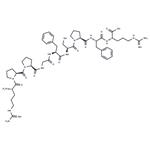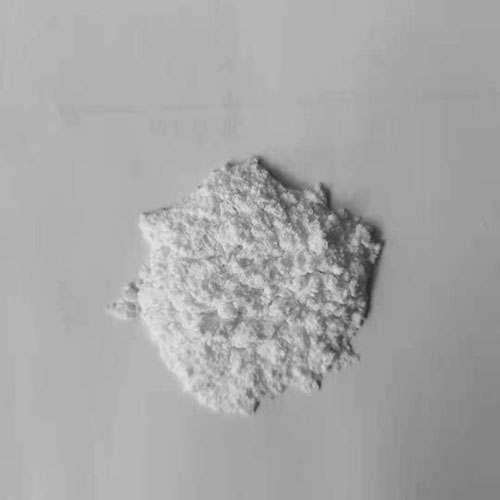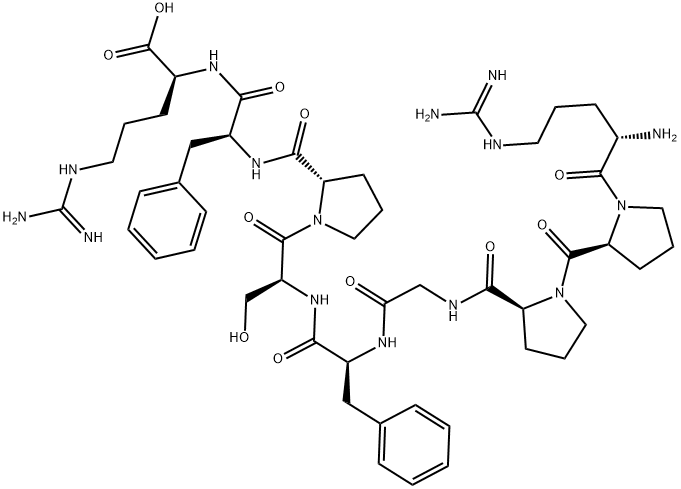Bradykinin
Jun 27,2022
Bradykinin (BK) is a short-lived, potent vasodilating peptide hormone that is highly involved in inflammation and edema formation. It is the major active hormone in the kallikrein-kinin system (KKS). The inhibition of the angiotensin converting enzyme partly delays the degradation rate, making this a target for drug development against hypertension and inflammatory diseases.
Discovery
BK was discovered through the observation that the incubation of plasma with snake venom from Bothrops jararaca produced a powerful hypotensive and smooth muscle stimulating factor. The BK sequences are relatively conserved among different vertebrate lineages. Skate BK sequence is highly different from other BKs. It was discovered by biochemical purification while molecular evidence of a functional kininogen (KNG) in cartilaginous fish is lacking. On the other hand, lamprey BK was discovered via genomic evidence but whether such a BK sequence exists is uncertain because the prediction of trypsin processing of the lamprey KNG does not produce lamprey BK.
Structure
Both BK and [Lys0 ]-BK are linear peptides with no known secondary structures. The N-terminal dibasic aa residues are resistant to trypsin digestion because of the presence of the proline residue that followed them. BK and [Lys0 ]-BK are peptides with 9 and 10 aa residues, respectively. Mr of BK 1060; Mr of [Lys0 ]-BK 1188 in humans. Both are readily dissolved in water.

Biological functions
BKs are potent endothelium-dependent vasodilators that contribute to vasodilation and hypotension in systemic circulation. BKs induce thirst in mammals. BKs also contract nonvascular smooth muscles in the bronchus and gut, increase vascular permeability, and are involved in pain perception. In the kidney, BKs induce natriuresis and diuresis, which lead to a decrease in blood pressure. BKs induce inflammatory responses via B1 and B2 in injured tissues. Via B2, BKs also induce antiproliferation, antiapoptosis, antifibrosis, antihypertrophy, and angiogenesis.
In teleosts, [Arg0 ]-BK or BK injection induced vasopressor or triphasic vasoactive responses and are antidipsogenic. In the skate, BK injection elicited transient hypertension and induced vasoconstriction in isolated branchial and mesenteric arteries.
Clinical implications
The activation of KKS is important in blood pressure regulation and inflammatory responses. The effects of BKs are mostly antagonistic to those of the RAS, thus KKS is being targeted in antihypertensive studies clinically.
Use for diagnosis and treatment
ACE has long been a target for hypertension treatment and the inhibition of ACE not only decreases the production of vasoconstrictive Ang II, but also delays the degradation of vasodilatory BK. The use of ACE inhibitors for treating hypertension has been a hallmark and specific agonists for KKS will continue to be a popular topic in hypertension research. Besides blood pressure-related diseases, kinins are also potential markers for respiratory allergic reactions, septic shock, heart diseases, pancreatitis, hereditary and acquired angioedema, Alzheimer’s disease, and liver cirrhosis.
- Related articles
- Related Qustion
Chloramphenicol was the first of the clinically useful antibiotics to be synthesized and the only one which is marketed in synthetic form today....
Jun 27,2022APIThe corticotropin-releasing factor (CRF)-like peptide in insects is a peptide hormone capable of regulating fluid excretion from the renal organ (Malpighian tubules).....
Jun 27,2022Biochemical EngineeringBRADYKININ
58-82-2You may like
BRADYKININ manufacturers
- Bradykinin
-

- $48.00 / 5mg
- 2026-02-26
- CAS:58-82-2
- Min. Order:
- Purity: 99.68%
- Supply Ability: 10g
- BRADYKININ
-

- $1.00 / 1KG
- 2019-12-23
- CAS:58-82-2
- Min. Order: 1KG
- Purity: 99%
- Supply Ability: 100KG






